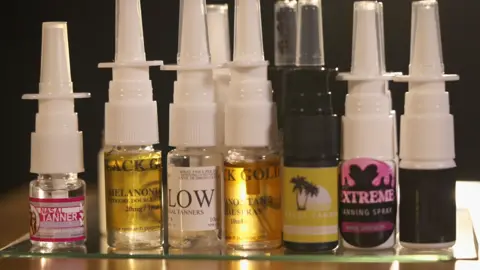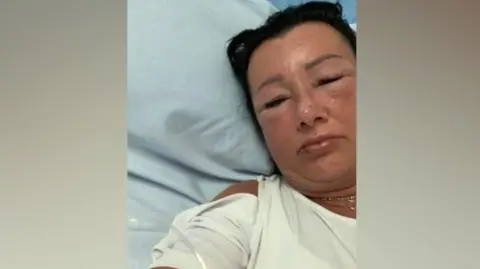Warning over 'unlicensed' nasal tanning sprays
 BBC
BBCTrading Standards has issued a warning about nasal tanning sprays and the potential health problems they could cause people who have used them.
It comes after a BBC North West investigation spoke to a woman who said she was left "unable to breathe" after suffering a reaction to an unlicensed spray she bought online.
The enforcement agency said the products could "cause nausea, vomiting, high blood pressure, and even changes in mole shape and size".
The Chartered Trading Standards Institute (CTSI) also believe that flavoured varieties of the sprays, which are being promoted and sold on social media platforms, could be targeting children.
Richard Knight lead officer for Cosmetics and Beauty at the CTSI said: "Unlike cosmetic products, nasal tanning sprays are unlikely to have had expert safety assessments and use of relevant health warnings and instructions for safe use are rare."
The body is now urging the public to avoid any tanning products that are inhaled or ingested, to use tanning creams and sprays bought from reputable retailers and report any unsafe products to Trading Standards.
Earlier this year reporters from the BBC managed to easily purchase sprays from beauty salons and tanning shops in Manchester and on Merseyside and a gym in Newcastle.
What are Nasal Tanners?
Nasal tanners are designed to be sprayed into the nostrils and are claimed to work by delivering a substance known as Melanotan II, a chemical that darkens skin pigmentation.
It is illegal to sell medicinal products containing Melanotan II in the UK, but as the tanners are sold cosmetically, they fall outside that remit.
But they are not covered by UK cosmetics regulations, meaning they are not subjected to the same scrutiny as other over-the-counter beauty products.
 Edith Eagle
Edith EagleEdith Eagle, from King's Lynn in Norfolk, bought tanners online believing they would give her an enhanced tan ahead of a planned holiday to Fuerteventura in April 2023.
She told the BBC she did not realise the product was unlicensed and unregulated.
On the second day of her holiday, she was rushed to hospital after her apparent allergic reaction worsened.
She said she felt like she was "suffocating inside" and "drowning" within her own body.
She said she was glad a warning had been issued and wanted to see "a zero tolerance approach to them".
Edith said her 16-year-old daughter was "a complete tan addict" and had also used the nasal tanning spray after seeing them advertised online but would "never touch them now" after seeing what happened to her.
"Health is so much more important than being so tanned for some Instagram pics," she said.
 Richard Knight
Richard KnightMr Knight said the nasal tanners were a "wild west-type product" and they were a "ticking time bomb" and something people could regret putting into their body at a later date.
"The people selling them literally have no clue what's in them, often they don't have a proper ingredients list" he said.
He said enforcing a ban on the products would be difficult because they were not classed as cosmetic products so the producer does not have to prove to trading standards that they are safe.
"It needs to become a national issue. We need to gather more evidence as a profession and to do that we need more intelligence, we need more complaints," he said.
He urged consumers in England and Wales to report any suspicious cosmetic products or if they had experienced any adverse reactions after using a product to Trading Standards
Health impact
Long term health impacts are not yet known, but cancer charities are concerned using the sprays could cause skin cancer like melanoma.
Susanna Daniels, from cancer charity Melanoma Focus, said she was " becoming increasingly concerned about the use of both nasal tanning sprays and tanning injections and their potential links with melanoma skin cancer".
She added: "These unregulated and illegal products not only pose serious health risks but also encourage harmful behaviours, particularly among young consumers.
The BBC bought 10 sprays from online and the high-street including beauty salons and sunbed stores, and the chemical Melanotan II was found in varying strengths in six of those tested.
Gary Lipman, chairman of the Sunbed Association said: "Nasal tanning sprays have absolutely no place in a professional tanning salon."
Read more stories from Cheshire, Lancashire, Greater Manchester and Merseyside on the BBC, watch BBC North West Tonight on BBC iPlayer and follow BBC North West on X.
